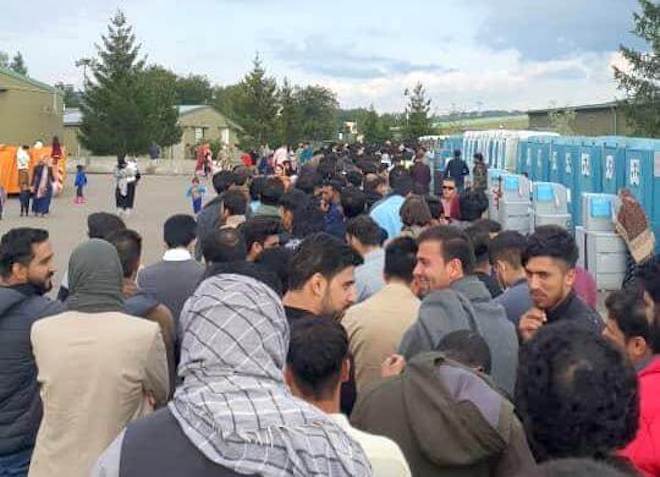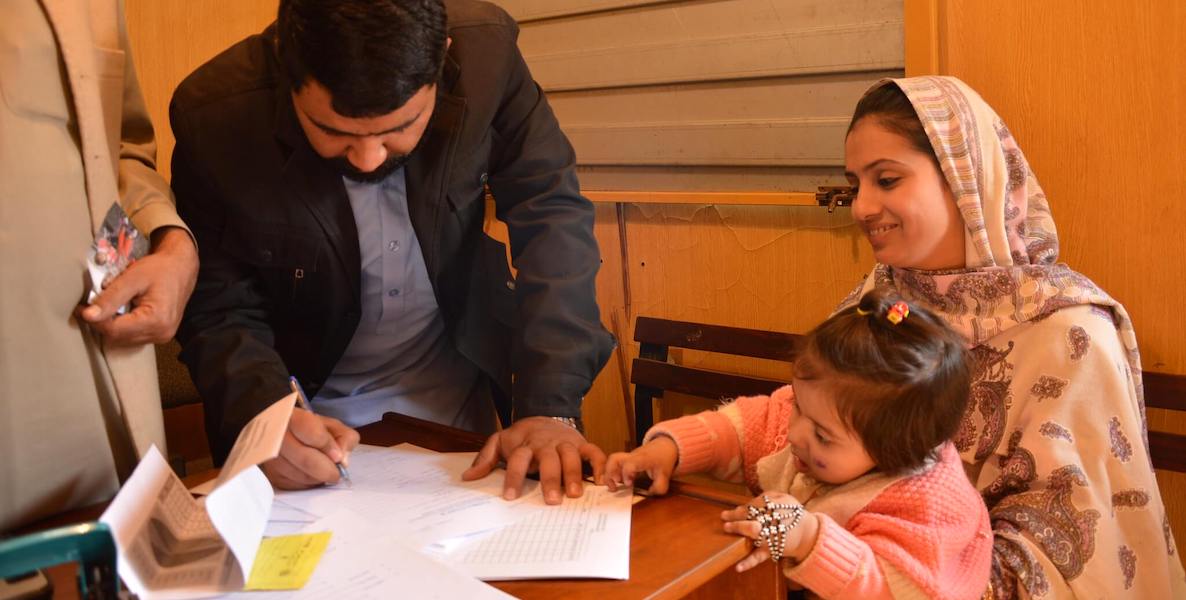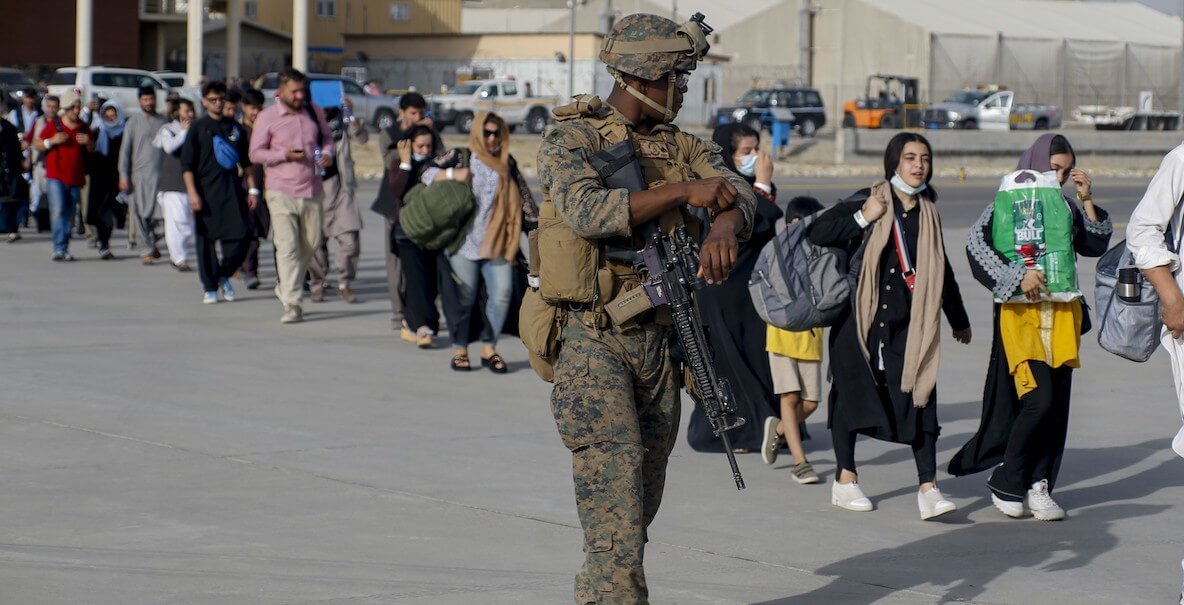[Editor’s note: The author of this story has asked to remain anonymous out of fear for the safety of his family remaining in Afghanistan. His account has been edited for clarity.]
The day that Kabul collapsed, I got a call from my office (I was working for the U.S. government) and they said, “Today the situation is not good and you should work from home.”
I went to go get money from the ATM with my cousin around 10:30 and I noticed that the traffic was much heavier than usual. We drove by the Ministry of Women’s Affairs and I saw women out in the street and shouting; everyone was trying to go everywhere. My cousin, who was driving, said, “Maybe people heard about a blast or suicide bombing.”
We still didn’t know that that day, at about 12 o’clock, Kabul would collapse completely.
After we parked the car, we heard people saying that the Taliban is on the border of Kabul. We started to walk back to our house when we noticed people running, so we also started running. Some of the parliament members, when the traffic got worse, came out of their cars and started running with their bodyguards.
RELATED: How you can help Afghan refugees in Philadelphia right now
We got to the Darul Aman Palace [across from the National Assembly Building in southwest Kabul] and in front, there was the Border Police Department—more than 50,000 soldiers. I saw the head of the police with three bulletproof cars and more than four Rangers; they got out of their cars and their bodyguards were running in front of them, and they went to their bases nearby. And I asked one of them, “What’s going on?” and they said, “Don’t ask, please go.”
When we got to the Kabul Parliament, which is very close to our house, I noticed that people dressed like Taliban were trying to enter the Parliament. But the police and the National Army were still on the gate. They killed two people that were dressed like Taliban. One of the bodies was in front of their tank and another one was in the street. There were guns firing everywhere—some boys entered the police station and got the guns and even the vehicles and the RPGs and were just firing.
When we finally arrived at our house, my brother came out to ask what happened to us. He was very worried, he cried, because we were not answering the phone. We thought that if we answered the phone, they might think we were reporting.
We started to walk back to our house. Then we noticed that people started running, so we also started running. Some of the parliament members, when the traffic got worse, came out of their cars and started running with their bodyguards.
The real Taliban arrived in our area around four o’clock. I messaged my colleagues and asked what to do, because everyone in the area knows that we are working with the U.S. government. They said, “We are trying to figure out something.” For the next five days we changed rooms and houses—to my mom’s, to my aunt and uncle’s—because we were afraid.
On August 18, I got a message from my colleagues: “You should come to the airport, and show your card and your documentation and they will let you come in.” I told them that, “Right now, I’m trying to hide and how can I bring my ID card because maybe there would be a checkpoint?” But I decided to accept that risk, because they said there is no other way.
I messaged other [Afghan] colleagues and they were wondering the same things: How would we bring clothes—if they notice that you’re leaving, something will happen to you. I told them that my advice is that we shouldn’t take anything and we should give our ID cards to our wives because I thought they would not search them—it’s kind of a cultural thing. So I gave my ID to my wife and I got my other documents like passports and put them in a compartment by my feet in the vehicle.
On the way, the taxi didn’t get searched much—they only stopped us at three points and asked where we were going. I told the driver, please, save us. It’s not easy to trust a driver, actually, but there was no option. It was good that he was from our village and was kind of familiar with our family.
When we were about 20 minutes away from the airport, the traffic started. The driver asked us to walk the rest of the way because the traffic was so bad. There were 25 to 30,000 people. Very, very crowded. The Taliban was there, shooting toward the sky. Inside the airport, was the U.S. Army and the Afghan police, which were helping the Army. They were trying to avoid opening because they were afraid—they were shooting up to the sky to show us that if we try to come in, they might shoot us, because they have no other option. I saw someone had been beaten by the Taliban and his hand was broken.
My four children started crying and my wife was repeatedly asking me, “Please let’s go back home.” I opened my jacket and threw it on the ground and told them to sit here. I will stand in front of them to protect them from the pushing crowd.
I reached out to my [American] colleagues and asked what to do. I told them, “It is not possible, there are more than 30,000 people, how do you cross?” I told them I cannot put my children and my wife and myself in danger. They said maybe they can send someone, wait and see. I sent them a video, and they said, “Oh yeah, it is impossible—go back and we will try to arrange something else.”
I took my children and we walked to the street and got a taxi. I asked my children, “Where do you want to go?” Because I thought, I should remove this image from their mind. I thought I would take them to a restaurant, but all the restaurants were closed. So I took them to a small shop, and I told them, take whatever you want. They took some biscuits and chips and we went back to our house.
For me and for my other brother, who had an important government position, it was not easy, because every single moment, we were thinking that they were going to come and ask for us. I didn’t sleep all night. Sometimes we asked our neighbors to bring some stuff for us like food.
I told my wife, “Listen, if they come to take me, please don’t stand in front of me. Don’t come out. I don’t want both of us to be in danger because then there could be no one to take care of the children.”
One night, I remember there was talking behind our house, in the language the Taliban speak, mostly Pashto. I told my wife, “Listen, if they come to take me, please don’t stand in front of me. Don’t come out. I don’t want both of us to be in danger because then there could be no one to take care of the children.” I wanted her to be emotionally prepared. All night sometimes she was praying, she was sometimes just looking at me.
After a week, we got a message that transport would be ready for us at Baghabala, which is about an hour and 20 minutes from our house, close to the airport. So I took my ID, passport, and some money that I had in the house—about $1,000 that we saved. I said goodbye to my mom.
We took a taxi and this time there were no searches at the three checkpoints. We arrived first and waited for my colleagues. We were taking a big bus, which started toward the airport at noon. At the first gate was the Taliban, then the Afghan Police about 20 meters away. They had already coordinated with the Taliban to let the car in. I remember that day even John Bass, the ex-ambassador of the U.S. Embassy in Kabul, was at the gate welcoming people coming into the airport. It was not easy to stand there that day, but I know he’s a very brave man.
The worst part started when we entered the airport. The weather was very hot—more than 32 centigrade degrees (90 Fahrenheit), and they were asking that people stand under the sun to be searched. We stood in line for more than two hours. There was no water. We asked the soldiers and they brought some water after two or three hours.
They took us to another place to do the body search—which they did very carefully. Then they took us to a very dirty, very crowded tent. We didn’t sleep all night. The weather was very cold and there was nothing to put on the children. So I just found a bag—I don’t know if someone threw it out or what—and I asked my children to sleep on that. I put my jacket on the floor for my other children.
We were there until five o’clock in the morning. Then they had us walk to a U.S. military plane. It doesn’t have any chairs, so they asked us to stand. I was reminded of movies where smugglers ask people traveling illegally to stand because more will be able to fit. It was the same thing. I think more than 500 people were on that plane. And it had only one toilet, and it was an eight hour flight. After two to three hours, everyone was shouting and crying because there was no space and no place to sit. I cannot even describe.
After eight hours we arrived in Qatar. And then we were inside the airplane for more than three hours. And the weather in Qatar was hot. So people were shouting “Please open the door.” At this point, we couldn’t breathe proper oxygen. I was thinking we might not survive—people are crying and shouting, yelling, “Please we are dying here.” No one was listening to us, soldiers were telling us to be patient.
After three hours, they let us out and sent us to a transit center. Because we hadn’t eaten for two days, everyone was running towards the food, which was actually good in Qatar.
A couple hours later, they flew us to Ramstein, Germany, where there was an American base. The weather there was very cold and it was raining. I remember everyone was shaking. They sent us to one tent, for a night, with just two blankets for all of us, and no food.
The first night, my 7-month-old child was crying to be fed but her mother didn’t have any milk. I went and cried to one of the soldiers and told them, “Please, I will give you money, just bring something for my wife because I don’t want to lose my children.” They told us, “We are sorry; we cannot do anything.” So I remember a very nice lady, she brought cold milk for my wife to drink. We are not familiar with cold milk and my wife didn’t know what would happen if she drank it. But I said, “Please drink it, there’s nothing else we can do.”
A few days later, they sent us to another camp about 40 minutes away. We were separated into men’s and women’s tents. My wife cried for five to six days, saying, “Why did you bring me into this situation? I can’t sleep because the tent was open, and maybe at night someone [dangerous] will come.” I was trying to convince her, saying, “Please, this is different than Afghanistan.”
On that base there were 20,000 to 25,000 people and there were only two tents providing the meals—and there was space for only 100 people. Sometimes at 8 o’clock I was standing in line and by the time I reached the door four hours later they said, “Breakfast is over so please wait, lunch is starting at three.” So I was missing lots of meals and I was not allowed to take food for my wife or children.

When we were there I found out that after I left, the Taliban noticed we were gone. They came and asked my mother and brother where we were and they took my car. I told my family to leave everything and leave the house. They never went back to find out what happened to the house. I am still worried about them and if anything ever happened to them I would never forgive myself and the danger I caused for working with the U.S. government.
We were there for 11 days and then got on a commercial airplane to fly to the USA. We arrived in D.C. on September 7 and stayed in a big tent with more than 400 people. and then went to a camp in Indiana the next day. Again, there were big lines to wait in—there was just one place to eat for every, I think, 3,000 people. We weren’t able to sleep together as a family, but during the day we would go to parks and woods around the camp.
Unfortunately, my daughter had a very high fever and diarrhea and was hospitalized for two nights there. So my wife was alone in camp and I was in the hospital. And my daughter, who was just four years old, was crying for her mother but only one of us was allowed to be with her. And then about two weeks later my third son was infected with mumps so they quarantined us for 12 days. But the good thing for us is that we were together. So we enjoyed it.
After that, we completed our biometric, our interview and our medical exams, and then we got a call from a resettlement agency in Philadelphia that told us we could fly out on October 16. We came to Philadelphia and we were welcomed to the airport by my brother and another relative.
They scheduled an appointment for us at the medical center, where they asked for our records. I had asked for a copy in Indiana and they said they would send it, but they didn’t. So the clinicians here said they would repeat all those vaccinations. I contacted our representative at the camp, a military guy I know and the camp management team. I was told, “Now that you are out of the camp, I’m not responsible for that. Don’t call me again.”
People are very nice here in Philadelphia. So sometimes we can actually forget what we experienced.
So they all had to get the same shots again. And my 7-month-old, they were supposed to call to check for a bump on his hand after one shot to make sure it was effective. But they forgot and told me we would have to come back and give him another shot. I was so frustrated and said, “Are we a joke? Are you making fun of us? This is inhumane.”
We were able to stay at my brother’s home while we were searching for a house for a few weeks. And now we are here in our own home right now.
I am very thankful for my colleagues because they helped me prepare my CV, which is a different style here. I applied for two jobs and I now have two offers, working with immigrants, with newcomers. And my colleagues, some of them sent gift cards to me and are always asking me how I’m doing, asking me about my kids. I’m very grateful for their support, for their patience.
My son is already enrolled in school and I received a lot of checks from donations to the resettlement agency, and people are very nice here in Philadelphia. So sometimes we can actually forget what we experienced.
The Citizen welcomes guest commentary from community members who stipulate to the best of their ability that it is fact-based and non-defamatory.
![]()
RELATED
Header Photo courtesy of U.S. Army





